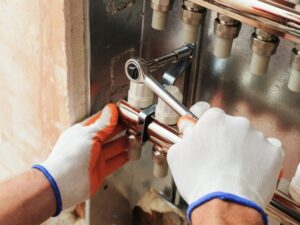5 Tips for Checking an HVAC System When Buying a New Home
Buying a new home is an exciting time for anyone. There’s a lot that goes into the decision-making process. You want to pick a safe neighborhood in Alexandria, Virginia, that has good schools, convenient amenities and all the characteristics you’re looking for in the perfect house. However, one feature that’s easily overlooked is the HVAC system. Here are a few tips for checking a home’s HVAC system before putting in an offer to buy a new home:
Conduct a Basic Cost-Benefit Analysis
The last thing you want to do is purchase a new HVAC system after buying a new home. It’s one thing if you’ve set money aside for this possibility, but most homebuyers can’t afford to pay a down payment and immediately upgrade key elements of a home. Central air conditioners and furnaces cost thousands of dollars in purchase and installation fees. That can feel like a stressful financial strain when you budget all your money to afford the mortgage.
There are some exceptions to the rule, though. Older homes may offer incredible deals that you can’t pass up. Even if you need to upgrade the HVAC system on an older home, you could come out ahead if the purchase price is right. Weigh the value of the home against the costs of upgrading the HVAC system to see if it makes financial sense to purchase it.
Evaluate the HVAC Equipment
Be sure to inspect the HVAC system when touring a prospective home. Listen for any strange sounds like clanging or hissing that could indicate problems. You’ll also want to look for water stains, cracks, rust, dents and other damages on the HVAC equipment itself.
If possible, request HVAC maintenance records from the homeowners. They should have no problem producing the records if they’ve kept up with their annual maintenance appointments.
HVAC systems that are more than 10 or 15 years old are ready for an upgrade. If the home you’re considering has an older system, negotiate a discount on the home’s selling price. That way, it’ll give you more wiggle room after you move in to schedule a new HVAC installation.
Inspect the Ductwork
Aside from examining the HVAC unit, you’ll also want to inspect the ductwork throughout the home to make sure it’s in tip-top shape. Look for any gaps, loose connections or signs of condensation along the ductwork. If they look particularly dusty, it means the homeowner hasn’t kept up their end of the maintenance bargain. That might suggest that you’ll need to upgrade the HVAC equipment after moving in.
If the homeowner has invested in indoor air quality add-ons, such as a whole-home dehumidifier or an air purifier, you’re in luck. When the indoor air quality is poor, though, you’ll need to invest in duct cleaning and HVAC additions after purchasing the house to boost airflow.
Ask About the Insulation
Another issue to consider is the home’s insulation. Ask the homeowner what type of insulation the home has and when they added it. Insulation tends to settle over the years, and when new insulation isn’t added, the home can develop leaks or drafts. Drafty rooms make it more difficult to heat and cool the house evenly. That can cause the HVAC system to work harder and consequently increase energy bills.
Consider the Refrigerant Being Used
Older HVAC systems may use a refrigerant called R-22, which is a substance that’s been banned by the Environmental Protection Agency (EPA). If the home’s system still runs on R-22, you can still use the refrigerant, but you might have difficulty finding a regular supply. That’s because R-22 will be completely illegal to produce by 2020. You’ll either need to replace or retrofit your HVAC system to utilize a safer type of refrigerant.
When in doubt, have a qualified service technician inspect the home’s HVAC system before you put in an offer. Call Brennan’s Heating & Air Conditioning at 703-783-0145 to speak with a friendly representative and schedule an appointment.
Image provided by Shutterstock
You May Also Like

What Are Variable-Speed Heat Pumps in Stafford, VA?
When winter temperatures plunge and your heating bills climb, homeowners across Stafford, VA, are discovering a smarter way to stay comfortable. Variable-speed… Continue Reading What Are Variable-Speed Heat Pumps in Stafford, VA?…

Furnace Maintenance in Fairfax Station, VA: Don’t Delay!
The first blast of winter air hits differently in Fairfax Station, VA. One moment you’re savoring the last golden leaves drifting past… Continue Reading Furnace Maintenance in Fairfax Station, VA: Don’t Delay!…

How a Duct Cleaning Can Boost Your Health and Comfort
While your heating system blows warm air through your Fairfax Station, VA, home, invisible dust and allergens can swirl through the ductwork.… Continue Reading How a Duct Cleaning Can Boost Your Health and Comfort…


